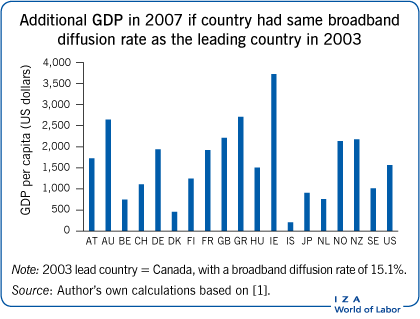Elevator pitch
Broadband infrastructure enables fast access to the internet, which, evidence suggests, has significant effects on economic growth. However, labor market related issues have not received as much consideration. These include quantifying employment effects of broadband infrastructure roll-out and questions about who exactly are the winners and losers in the labor market, and whether skills in information and communication technologies (ICT) are reflected in labor market outcomes such as wages. Understanding these complementary issues allows for policy conclusions that go beyond simply encouraging the subsidization of broadband internet infrastructure.
Key findings
Pros
The roll-out of broadband internet infrastructure generates economic growth, partly through firm entry.
The employment effects of broadband infrastructure are small, but positive.
Broadband internet infrastructure complements skilled workers.
Access to broadband internet enables the accumulation of ICT skills, which are substantially rewarded in the labor market.
Cons
The positive employment and firm-entry effects of broadband internet infrastructure are limited to certain industries and/or locations.
Broadband infrastructure creates losers among low-skilled workers.
Adoption of high bandwidth internet connections is slow in many countries.
The share of workers without basic ICT skills is considerable in developed countries.
Slow adoption of high bandwidth internet connections and lack of ICT skills might limit the growth effects of broadband internet infrastructure.
